Key takeaways:
- Overestimating portion sizes is a common cause of food waste, leading to reflections on consumption habits.
- Implementing strategies like meal planning, utilizing leftovers, and fostering a sense of community can effectively reduce food waste.
- Adopting efficient storage solutions and a ‘first in, first out’ system can significantly minimize waste and enhance meal preparation.
- Tackling food waste can foster sustainable practices, improve financial savings, and create meaningful connections through shared experiences in cooking.
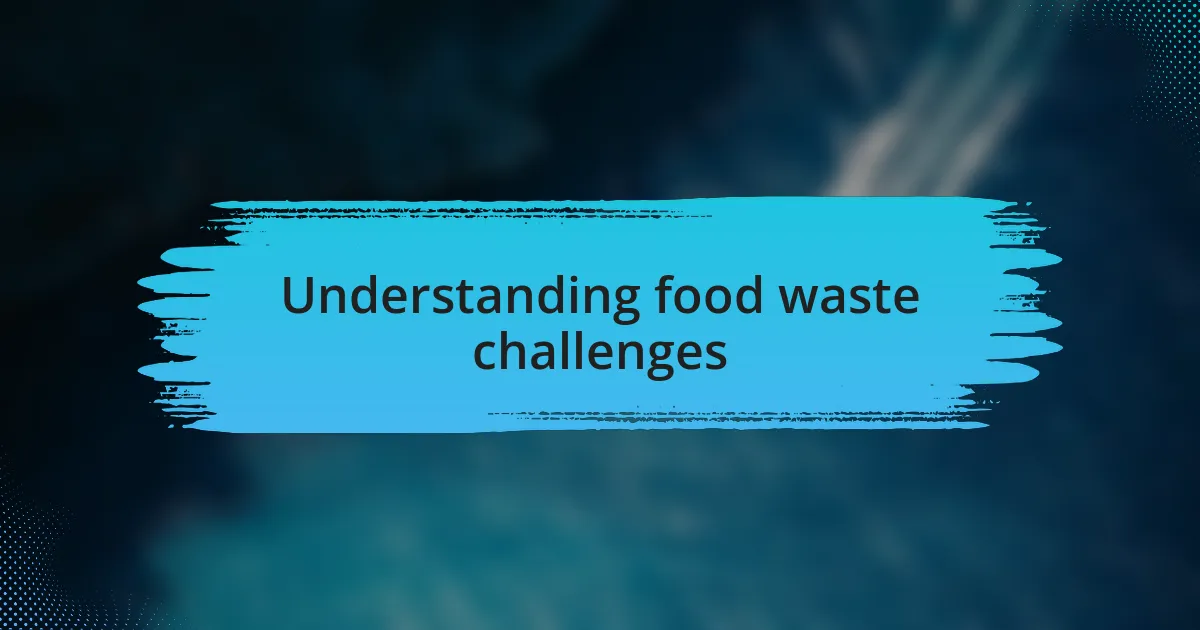
Understanding food waste challenges
Food waste challenges can often feel overwhelming, especially when I think about the sheer volume of edible food that ends up in landfills. Once, during a lavish dinner party on my yacht, I found myself staring at a mountain of uneaten gourmet dishes. It made me wonder—how did I let that much effort and resources go to waste?
Understanding the root causes of food waste has been a journey for me. While preparing meals for guests, I realized that overestimating portion sizes was one of my biggest pitfalls. Have you ever noticed how easy it is to cook more than necessary? The guilt of throwing perfectly good food away can be a heavy burden, and it pushed me to reflect on my consumption habits.
During my travels, I’ve encountered various cultures and their unique approaches to managing food waste. I remember discussing this with a French chef who passionately believed in “nose-to-tail” cooking, where every part of the ingredient is utilized. This enlightening moment made me think about how we can adopt similar philosophies to reduce waste in our own kitchens and ensure that nothing goes unappreciated.
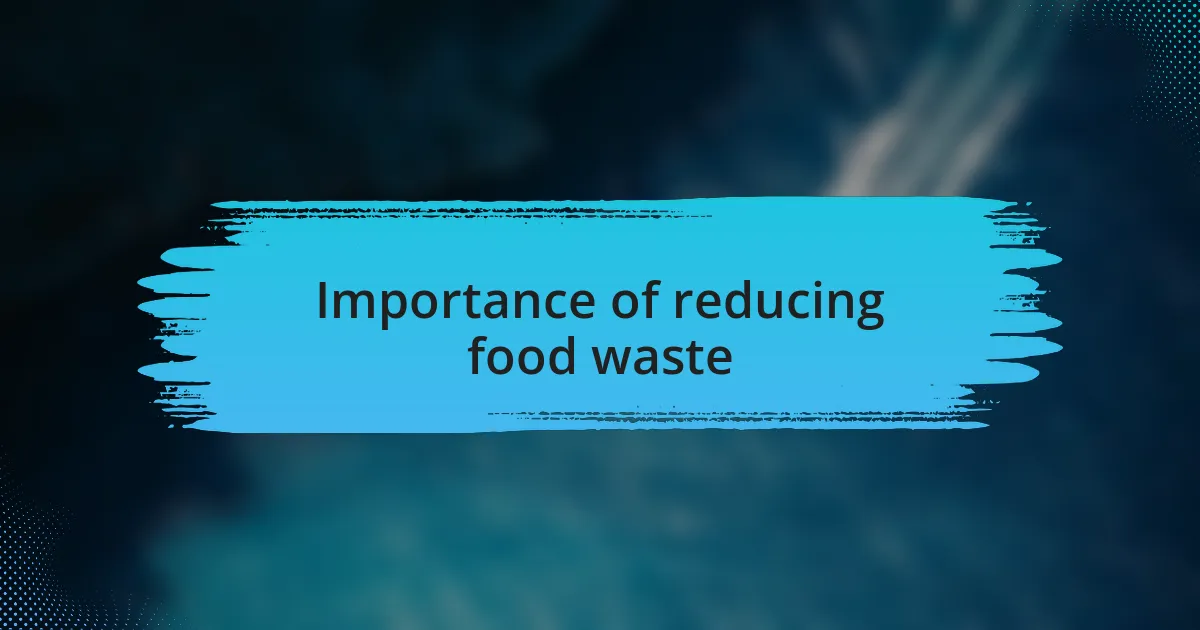
Importance of reducing food waste
Reducing food waste is crucial for both the environment and our wallets. I’ve personally witnessed the positive effects of mindful consumption while navigating the high seas. After implementing better meal planning aboard my yacht, I noticed not only a decrease in waste but also savings on provisioning costs. It was a win-win that sparked my curiosity about how others might benefit from similar practices.
In my experience, the emotional connection to food plays a significant role in how we perceive waste. I once prepared a community meal for fellow yacht enthusiasts, thoughtfully utilizing every ingredient. Watching them savor each dish made me realize food brings people together, and wasting it not only squanders resources but also the joy it can create. Have you ever experienced a meal that stuck with you far beyond the taste? That memory underscores why every bite matters.
Additionally, reducing food waste sends a powerful message about sustainability. The hospitality industry, especially on luxury yachts, has an opportunity to lead by example. When I began sharing my journey of minimizing waste with my crew and guests, I noticed they became more conscious of their choices, too. We can inspire each other—what if every meal served took a moment to celebrate both the culinary art and the commitment to preserving our planet?

Sustainable practices for luxury yachts
Adopting sustainable practices on luxury yachts goes beyond just eco-friendly products; it involves a holistic approach to lifestyle and behavior. I remember when I started implementing a zero-waste philosophy within my crew, emphasizing the importance of composting and recycling. It was rewarding to see their enthusiasm grow as they embraced these changes, transforming our yacht into a model of environmental stewardship.
One practical step I’ve taken is sourcing ingredients locally at each port of call. This not only reduces our carbon footprint from transportation but also allows us to enjoy the freshest flavors the region has to offer. I recall a vivid sailing trip in the Mediterranean where we partnered with local fishermen. The fish we prepared that evening was not just a meal; it became a celebration of the local culture and a reminder that our choices profoundly impact communities we visit. How often do we consider the story behind our food as we dine?
Lastly, I found that integrating technology can significantly enhance sustainability efforts aboard luxury yachts. By utilizing apps that track food inventory and meal planning, I’ve been able to minimize surplus and maximize freshness. It’s fascinating how a little tech can lead to conscientious choices; have you ever thought about how such tools could reshape your approach to provisioning? I’ve discovered that being mindful of what we consume can create a more enriching experience, not just for the environment, but for everyone on board.
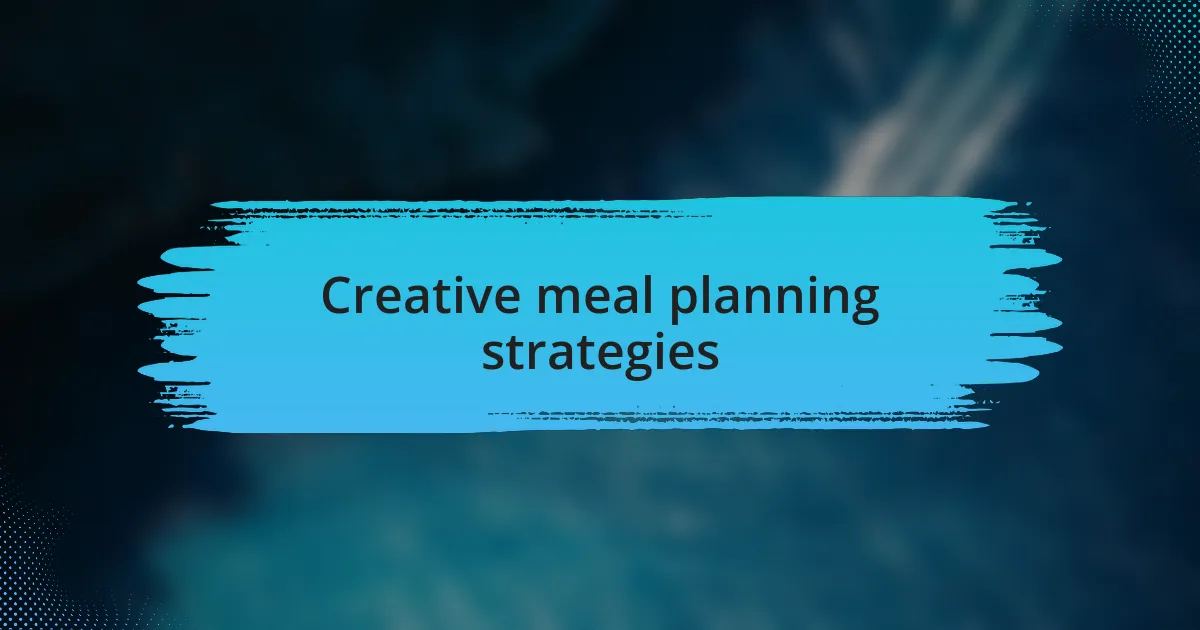
Creative meal planning strategies
One of my favorite strategies has been the “theme night” approach to meal planning. Each week, we pick a different cuisine and create a cohesive menu that reflects it—think Mediterranean mezze or classic Italian pasta nights. Not only does this make shopping streamlined, but it also turns cooking into a fun, collaborative experience for the crew. I remember the excitement during our Spanish night, where everyone gathered to learn about tapas. The laughter and shared stories transformed a simple dinner into a memorable event.
I also encourage creativity by keeping a rotating “surprise ingredient” every week. This encourages our chefs to use what’s available and to innovate rather than stick to a routine. The result? A deliciously unpredictable menu that keeps everyone on their toes! I still reminisce about the week we received a bountiful delivery of eggplant and ended up with an incredible ratatouille that dazzled my guests. It made me realize how often limitations spark brilliant ideas in the kitchen—have you noticed that too?
Lastly, I’ve implemented a “leftover challenge” where we aim to create gourmet meals from what’s already in the pantry and fridge. It’s amazing to witness what culinary magic can happen when we’re a bit resourceful. I vividly recall whipping up a steak salad using leftover grilled veggies, which turned out to be a guest favorite! This exercise not only minimizes waste but fosters a sense of pride in our culinary talents. Isn’t it rewarding to turn what might have been discarded into something extraordinary?
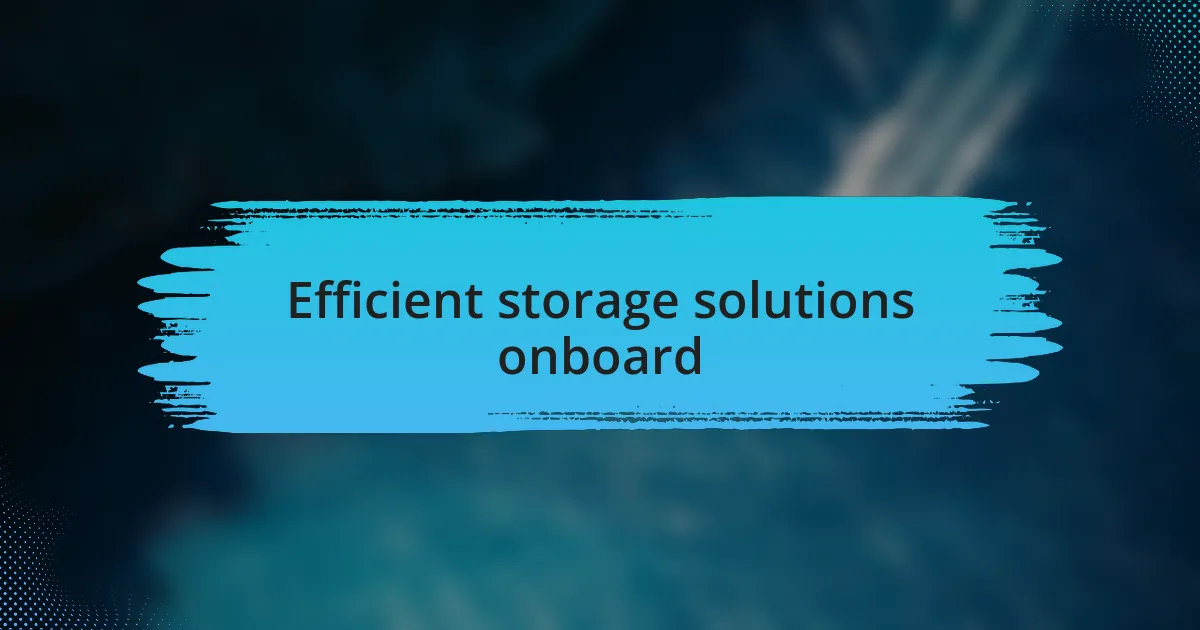
Efficient storage solutions onboard
Efficient storage solutions onboard can truly transform the way we approach food management. I’ve found that utilizing stackable containers not only maximizes space, but also keeps ingredients organized and easily accessible. I recall a moment when I switched to clear bins; it was a game changer for quickly finding items and, believe me, it cut down my cooking prep time significantly. How often have you rummaged through cluttered drawers, wishing for a better system?
Another solution that’s proven invaluable is creating designated zones for specific food types. By allocating areas for dry goods, frozen items, and fresh produce, everyone on board knows exactly where to look. I remember the first week we tried this; it felt like a mini-revelation. Suddenly, cooking was more efficient and our meals became more varied. Have you ever experienced that moment when everything just clicks into place in the kitchen?
Lastly, utilizing vertical space has made a world of difference. I installed hooks to hang pots and herbs, freeing up counter space for meal prep. It’s astonishing how a simple adjustment can enhance workflow. One of my favorite moments was harvesting fresh basil right at arm’s reach while preparing a sumptuous pesto, which felt like luxury in itself! Isn’t it amazing how thoughtful storage can elevate the entire cooking experience on a yacht?

Personal journey with food waste
As I dove deeper into tackling my food waste issues, I was surprised to realize how much we were throwing away. One evening, while cleaning out the fridge, I discovered a wilted bunch of herbs I had neglected. It struck me then that these small oversights accumulate, leading to waste that not only impacts the environment but also my budget. Have you ever faced this moment of realization, where the need for change suddenly feels urgent?
Implementing a ‘first in, first out’ approach to our pantry changed the game for me. I set up a simple system where older items were moved to the front, making them more visible and ensuring they were used first. The satisfaction I felt when I made a delicious soup from forgotten ingredients was palpable. This practice truly transformed our meals and breathed new life into what could have been discarded. Have you ever experienced that unexpected joy of turning overlooked items into something delightful?
The emotional journey was just as significant as the practical changes. I found that reducing waste gave me a sense of control and responsibility. Each time I used up leftover food creatively, I felt a surge of accomplishment and a connection to the environment. It reminded me that every little effort counts, and isn’t it empowering to know that we can each make a difference, even in our small kitchens onboard?
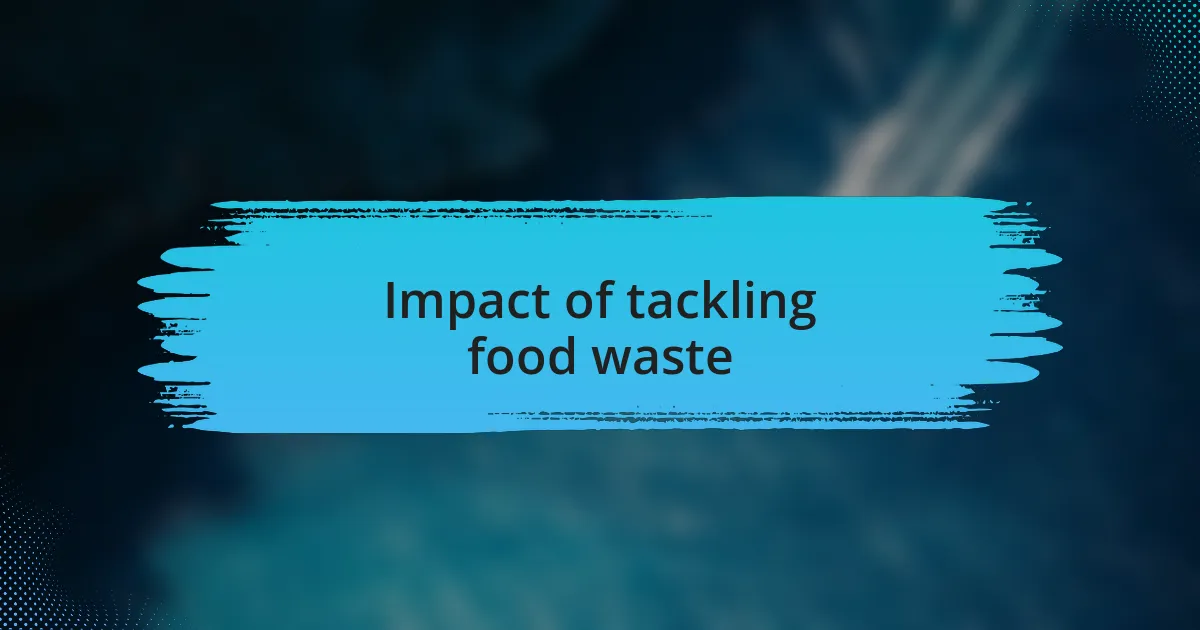
Impact of tackling food waste
Tackling food waste can have a profound impact on one’s lifestyle and values. I remember hosting a dinner party where I deliberately planned my menu to use up the ingredients I had on hand. Not only was I able to minimize waste, but I also found that my guests appreciated the creativity behind the dishes, sparking conversations about sustainability and conscious consumption. Isn’t it remarkable how a simple shift in our mindset can turn what feels like a burden into an opportunity for connection?
As I embraced these changes, I noticed a ripple effect in my household. My family became more aware of their own consumption patterns, even encouraging each other to get involved in meal prep. One night, we teamed up to create a taco night using leftovers from the week. The laughter and teamwork made it memorable, reinforcing our collective responsibility to reduce waste. Wouldn’t you agree that shared experiences can often lead to lasting habits?
Moreover, the financial benefits of reducing food waste can’t be overlooked. I have seen my grocery bills shrink significantly since I started being more mindful. By planning meals around what we already had, I felt relieved knowing I was spending less while still enjoying varied and delicious dishes. It’s a powerful reminder that innovation often arises from constraints, don’t you think?